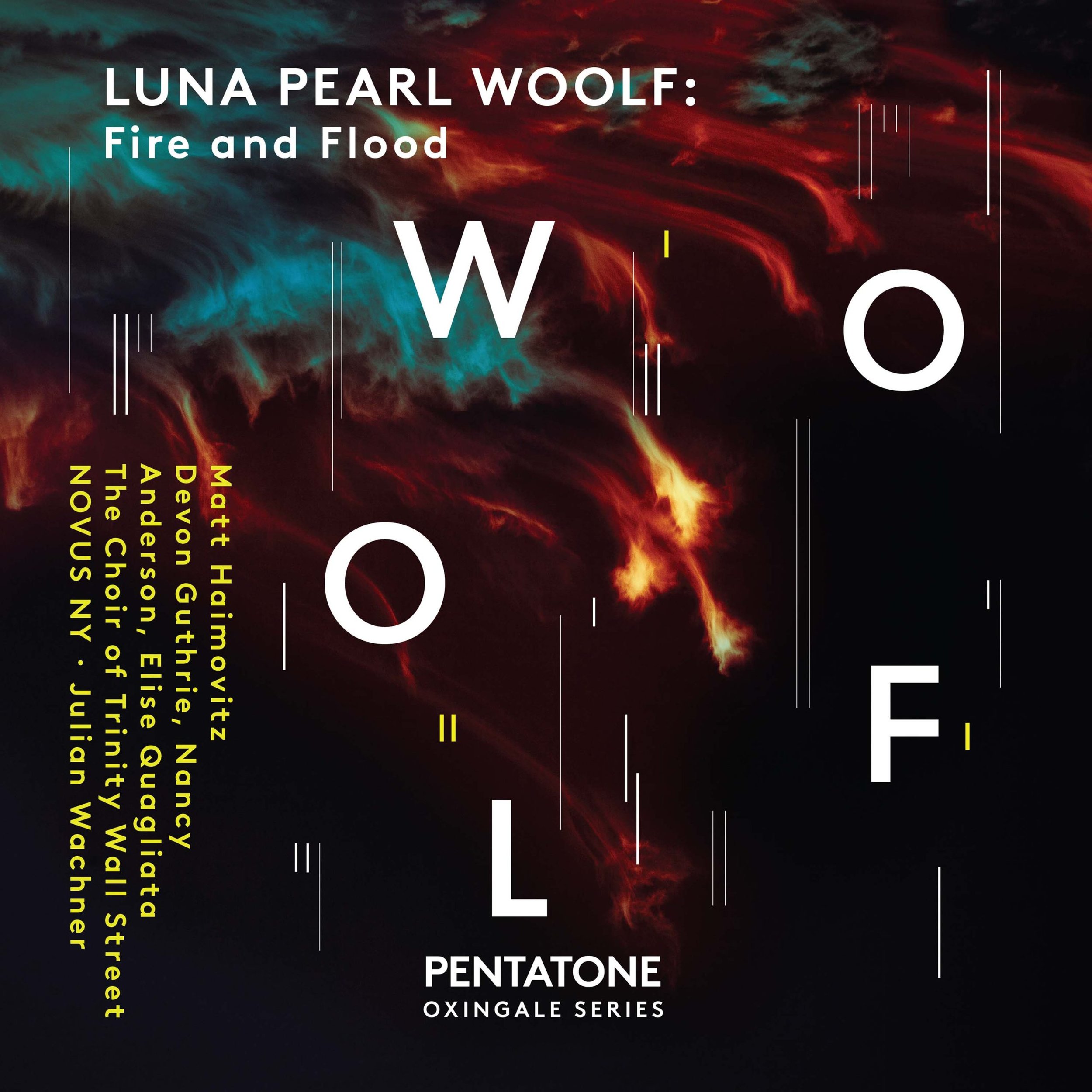LUNA PEARL WOOLF: Fire and Flood
VOCAL WORKS WITH A PROFOUND HUMANITY
From a deeply stirring Mass to hauntingly re-imagined Leonard Cohen masterpieces, LUNA PEARL WOOLF: Fire and Flood encompasses 25 years of vocal works by composer Luna Pearl Woolf, as performed by the Choir of Trinity Wall Street, cellist Matt Haimovitz, and more, conducted by Julian Wachner. In her penetrating album notes, New York Times contributing writer Corinna Da Fonseca-Wollheim comments, “Luna Pearl Woolf trains a zoom lens on the collective experience, sometimes plunging us right into the midst of destruction and anarchy only to pull back, in one swoop, to a clear-eyed plane of compassion.” These arresting works include her frequently-performed cello-choir concerto, Après moi, le deluge, which emerges from the tragic aftermath of Hurricane Katrina; and the dramatic, low-voiced To the Fire, with its prophetic, Old Testament text. In One to One to One, “three female singers reflect and refract the male gaze in an uproar of vocal virtuosity” (Da Fonseca-Wollheim); while Missa in Fines Orbis Terrae journeys to the ends of the earth in search of revelation, mercy, peace. Finally, two inventive arrangements for three voices and cello create a kaleidoscopic expansion of colors and timbres in Cohen’s ironic Everybody Knows and foreboding Who By Fire. Noted among a new generation of politically conscious and artistically progressive composers, Woolf has been heard widely across North America and in Europe. Her music is praised by The New York Times for its “psychological nuances and emotional depth.”
-
To the Fire, For AATBBBs Choir a capella (1994, rev. 2018) (12:18)
Après moi, le déluge, For Solo Cello and SATB Choir a cappella (2006) I. (7:10)
Après moi, le déluge, For Solo Cello and SATB Choir a cappella (2006) II. (4:54)
Après moi, le déluge, For Solo Cello and SATB Choir a cappella (2006) III. (6:09)
Après moi, le déluge, For Solo Cello and SATB Choir a cappella (2006) IV. (6:17)
Everybody Knows, For Three Solo Voices and Cello (arr. 2016) (5:05)
Missa in Fines Orbis Terrae, For Choir and Organ (2017) I. Kyrie (3:07)
Missa in Fines Orbis Terrae, For Choir and Organ (2017) II. Sanctus & Benedictus (5:03)
Missa in Fines Orbis Terrae, For Choir and Organ (2017) III. Agnus Dei (3:53)
One to One to One, For Three Female Voices, Three Cellos and Three Basses (2016) I. (2:06)
One to One to One, For Three Female Voices, Three Cellos and Three Basses (2016) II. (3:40)
One to One to One, For Three Female Voices, Three Cellos and Three Basses (2016) III. (2:43)
One to One to One, For Three Female Voices, Three Cellos and Three Basses (2016) IV. (3:15)
One to One to One, For Three Female Voices, Three Cellos and Three Basses (2016) V. (2:52)
One to One to One, For Three Female Voices, Three Cellos and Three Basses (2016) VI. (2:55)
Who by Fire, For Three Female Voices and Cello (arr. 2016) (3:53)
-
Rendered into English, the Latin word turba means crowd, or uproar. In music, the term has come to be defined by the rabble choruses in Bach’s Passions. With their raucous, angular music — full of spit and venom and recognizably human follies — they sit directly opposite the contemplative chorales that Bach holds up as models of a human collective aligned with a higher order. Since then, virtually all choral music has made its home in the space between uproar and harmony, between the stubbornly individual, jostling for attention in a sea of Others, and the peace arising from communal contemplation. In the works on this album, Luna Pearl Woolf trains a zoom lens on the collective experience, sometimes plunging us right into the midst of destruction and anarchy only to pull back, in one swoop, to a clear- eyed plane of compassion.
In To the Fire she takes us into the heart of a riot with shocking immediacy. You can almost see the gap-toothed cackle, the destructive glee spreading like a rash. Yet she also offers us passages that seem to propel the revelers into the future, looking back on the moment in deep regret. Composed in 1994, it now reads as a Cassandrian prophecy of environmental depredation – or perhaps, just as vividly, as the foreshadowing of the violent glee of a Twitter mob.
Multiple perspectives and focal planes weave together into a powerful indictment of political hubris in Après moi, le déluge. Named after a notoriously callous remark attributed to Louis XV of France, the piece revisits the aftermath of Hurricane Katrina in traumatic, painterly detail. Woolf draws on a multitude of musical influences to both root the work in its New Orleans context and evoke the loss of a world teeming with diverse life. Here, too, the ghost of Bach can be felt, not only in the snippet of a Lutheran chorale that joins the other fragments of musical quotes that seem to float by like debris, ripped from all context. There is also the juxtaposition of the choral collective with the wordless voice of Matt Haimovitz’s solo cello. Just as Bach does in some of his cantatas and Passion arias, the instrumental solo sublimates the human experience to a universal level that is beyond language. We feel more than we hear the visceral anguish of the cello’s opening wail, rising to desperate heights. Later, we are drawn into the profound melancholy of a ruminating, elegiac passage.
Missa in Fines Orbis Terrae takes a more conciliatory bent than the other pieces on this album. And yet the music sheds light on the imperfections humans introduce into the world from the very beginning, when the open, perfect interval of the organ’s octaves is muddied by voices entering in queasy, close harmonies.
Woolf’s arresting versions of two songs by Leonard Cohen, “Everybody Knows” and “Who by Fire” help to further complicate the notion of the universal. Yes, we all have to die, but what a variety of deaths and legacies we can fear and — dare we admit — hope for! And the more the narrator invokes the consensus of an “everybody,” the more his individual moral perspective is crystallized. Once again, the solo cello muscles in on the conversation as the insistent inner voice we so rarely pay heed to.
One to One to One also uses music to bring to the surface complexities and contradictions. This time Woolf draws inspiration from visual art, from the elemental power of Jim Dine’s 14-foot sculptures carved from redwood with chainsaw and stained with vivid colors. Larger-than-life and louder-than-life women are of course a specialty of Western classical music, even if their intended purpose was more often to warn and titillate than to inspire. Woolf takes a poem by Robert Creeley that seems poised at the very point where desire spills over into possessiveness – and then sets it with an orchestration that tips the balance of power in favor of the female object of desire. Three cellos and three double basses get to stand in for the male viewer dumbstruck by lust while three female singers reflect and refract the male gaze in an uproar of vocal virtuosity.
-
Release Date: June 11, 2020
Label: PENTATONE Oxingale Series (PTC 5186803)
Artist:
Matt Haimovitz, Devon Guthrie, Nancy Anderson, Elise Quagliata, Avi Stein, Julian WachnerComposers: Luna Pearl Woolf
Recorded September 5 and 6, 2018 at LeFrak Concert Hall, Aaron Copland School of Music,
Queen’s College, City University of New York, Flushing, NY and September 7, 2018 at
St. Paul’s Chapel of Trinity Church Wall Street, New York City, NY
Producer: Blanton Alspaugh, SoundMirror
Recording Engineer: John Newton, SoundMirror
Mixing, mastering and surround: Mark Donahue, SoundMirror
Post-production consultant: Melissa Attebury, Associate Director of Music, Trinity Church Wall Street
Project management: Jordan GasparikTRINITY CHURCH WALL STREET
Production Manager and Librarian: Harrison Joyce
Choral Contractor: Thomas McCargar
Senior Artistic Administrator: Melissa BakerCover photograph: Daniel Forniés Sòria
Design: Marjolein Coenrady
Product management: Kasper van Kooten

